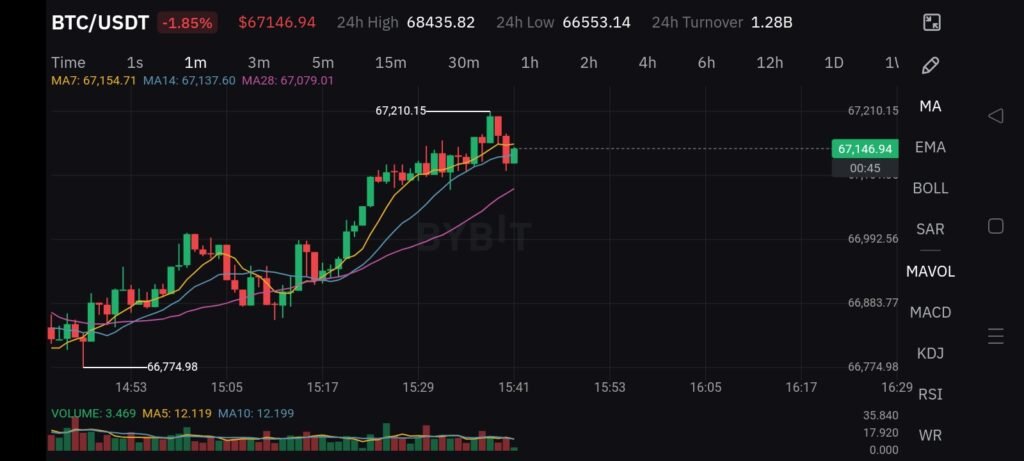Cryptocurrency Definition and Description
Cryptocurrency is any type of currency in digital or virtual form; cryptocurrency uses encryption (cryptography) to secure transactions.
What is cryptocurrency?
Cryptocurrency payments exist entirely digitally in an online database that records specific transactions. They do not involve physical money that circulates and can be exchanged in the real world. When transferring funds in cryptocurrency, the transactions are recorded in a public ledger. Cryptocurrency is stored in digital wallets.
The term Cryptocurrency has come into common use because encryption (cryptography) is used to verify transactions: advanced coding is used to store and transmit cryptocurrency data between wallets and to public registries.
Bitcoin was the first cryptocurrency, created in 2009 and which is most famous today. Trading cryptocurrencies is interesting from the point of view of making a profit; as a result of speculative actions, price jumps in cryptocurrencies are periodically observed.
How is cryptocurrency used?
Cryptocurrencies are processed on a distributed public ledger – a blockchain – where records of all transactions are stored and updated by currency holders.
Cryptocurrency units (coins) are made with the process of mining. This is a process in which the computing power of a computer is used to solve complex mathematical problems, which results in the generation of coins. Users can also buy the currency from brokers and then store and spend it using cryptographic wallets.
Cryptocurrency is not a tangible object, it is a key that allows a record or unit of measurement to be moved from one person to another without a trusted third party.
Bitcoin has been around since 2009, but cryptocurrencies and the use of blockchain technology are still in their infancy in financial terms; they are expected to grow rapidly in the future. Cryptocurrencies could potentially be used in trading stocks, bonds, and other financial assets.
Examples of cryptocurrencies
There are thousands of cryptocurrencies. The most famous coins are given below:
Bitcoin
Bitcoin, created in 2009, was the first cryptocurrency and remains the most popular. The currency was developed by Satoshi Nakamoto, who is believed to be a pseudonym for a person or group of people, and the exact identity of the developer remains unknown.
Ethereum (Ethereum)
The Ethereum blockchain platform was developed in 2015. It has its own cryptocurrency, Ether (ETH) or Ethereum. It is the 2nd most epensive and popular cryptocurrency after Bitcoin.
Litecoin
This currency is most similar to Bitcoin, but it is more rapidly developing innovations such as faster payments and processes that allow for more transactions.
Ripple
Ripple is a system founded in 2012. Ripple can also be applied in monitoring several transaction types, other than cryptocurrency. The company behind the development of the Ripple platform has cooperated with different banks and financial institutions. These other cryptocurrencies, except for Bitcoin, are called by the general term “altcoins,” to differentiate them from the predecessor.
How to buy cryptocurrency?
The question may arise as to how to buy cryptocurrency safely. This usually happens in three stages.
Step 1. Choosing a platform
- The first step is to choose a platform to use. Typically, you can choose between a traditional broker or a specialized cryptocurrency exchange.
- Traditional brokers. These are online brokers that offer buying and selling of cryptocurrency, as well as other financial assets: stocks, bonds, ETFs. These platforms usually offer lower trading fees, but fewer crypto features.
- Cryptocurrency Exchanges: There are many cryptocurrency exchanges, each offering different cryptocurrencies, wallet storage, interest account options, and more. Many exchanges charge fees based on the assets being traded.
- When comparing platforms, it is recommended to pay attention to the cryptocurrencies traded, fees, security features, storage and withdrawal options, and educational resources.
Step 2. Depositing funds into the account
- The next step after choosing a platform is to fund your account so that you can start trading. Most cryptocurrency exchanges, depending on the platform, allow users to buy cryptocurrency with fiat currencies such as the US dollar, British pound, euro, and debit or credit cards.
- Cryptocurrency purchases with credit cards are considered risky and are therefore not supported by all exchanges. Some companies do not allow cryptocurrency transactions. This is due to the extremely high volatility of cryptocurrencies – when trading certain assets, it is not recommended to risk making trades on credit or potentially paying high fees for credit card transactions.
- Some platforms also accept ACH (Automated Clearing House) and wire transfers. Accepted payment methods and deposit and withdrawal times vary by platform, and deposit clearing times vary by payment method.
- An important factor to consider is the size of the fees, which includes potential deposit and withdrawal fees, as well as trading fees. Fees vary depending on the payment method and platform, and are something to consider when choosing a platform.
Step 3: Place your order
Orders can be placed via the website or mobile app of the chosen broker or exchange. To buy cryptocurrency, you need to select the “Buy” option, the order type, specify the amount of cryptocurrency to be purchased and confirm the order.
There are other ways to invest in cryptocurrency. These include payment services such as PayPal, Cash App, and Venmo, which allow you to buy, sell, and store cryptocurrency. In addition, there are the following investment vehicles:
- Bitcoin Trusts : Shares in Bitcoin trusts can be purchased using a regular brokerage account. These vehicles provide individual investors with access to cryptocurrency through the stock market.
- Bitcoin Mutual Funds : There are Bitcoin ETFs and Bitcoin mutual funds.
- Blockchain Stocks and ETFs . You can indirectly invest in cryptocurrency through blockchain companies that specialize in the technology behind cryptocurrency mining and cryptocurrency transactions. Alternatively, you can buy shares or ETFs of companies that use blockchain technology.
How to store cryptocurrency?
Once purchased, it is necessary to ensure secure storage of cryptocurrency, guaranteeing protection from hacking and theft. Cryptocurrency is usually stored in crypto wallets. Some exchanges provide wallet services, due to which the storage of cryptocurrency funds is carried out directly by the platform itself, however, not all exchanges and brokers provide such services automatically.
There are also different wallet providers. The storage are of two types: “hot wallet” and “cold wallet”.
- A hot wallet is a cryptographic storage that uses online software to protect private keys to assets.
- A cold wallet (called as hardware wallet), unlike a hot wallet, uses offline electronic devices to store private key.
Typically, there is a fee for using cold wallets, while there is no fee for using hot wallets.

What can you buy with cryptocurrency?
Bitcoin was originally intended to be a means of everyday transactions, allowing you to buy anything from a cup of coffee to a computer or even expensive items like real estate. Despite the growing number of institutions accepting cryptocurrencies, large transactions using cryptocurrencies are quite rare. However, you can buy various goods on e-commerce sites with cryptocurrency. Here are a few examples.
Tech company and e-commerce websites
Some companies that sell technology products accept cryptocurrency payments on their websites. Examples including newegg.com, AT&T, and Microsoft. Shopify and Home Depot can accept Bitcoin.
Luxury goods
a few of luxury retailers accept cryptocurrency a form of payment. For example, online luxury retailer Bitdials offers Rolex, Patek Philippe, and other luxury watches for Bitcoin.
Cars
Some car dealers, from mass-market brands to luxury dealers, also accept cryptocurrency as payment.
Insurance
In April 2021, Swiss insurance company AXA announced that it would begin accepting Bitcoin as a payment method for all insurance plans except life insurance (due to regulatory concerns).
To pay with cryptocurrency at a store that doesn’t accept it directly, you can use a cryptocurrency debit card, such as BitPay in the US.
Cryptocurrency Scams
Unfortunately, there has been an increase in cryptocurrency related crimes. Cryptocurrency related scams can take one of the following forms.
Fake Websites : Scam sites with fake reviews and crypto jargon promising huge guaranteed returns if you keep investing.
Virtual Ponzi Schemes : Cryptocurrency scammers advertise non-existent digital currency investment opportunities, creating the illusion of huge profits while paying off earlier investors with new investors’ money.
Cryptocurrency endorsement by pseudo-billionaires . By posing as billionaires and famous personalities online, scammers promise to increase investments in virtual currency, but in reality they appropriate the funds sent by users. Scammers can also use messaging apps or chats to spread information that a famous businessman supports a certain cryptocurrency. As a result, investors start buying the cryptocurrency, the price rises, and then the scammers sell their share, and the price of the currency falls.
Online Dating Scams : The FBI is reporting an emerging trend of online dating scams in which users of dating apps or social media are persuaded to invest or trade in virtual currencies. In the first seven months of 2021, the FBI’s Internet Fraud Complaint Center received more than 1,800 reports of cryptocurrency-related online dating scams, with losses reaching $133 million.
Scammers may also pose as legitimate virtual currency traders or create fake exchanges to trick users into giving them money. Another type of cryptocurrency scam involves scams offering cryptocurrency-based individual retirement accounts. The cryptocurrency wallets are then hacked and the virtual currency is stolen.
Is cryptocurrency safe?
Cryptocurrencies are usually based on the use of blockchain technology, which describes how transactions are recorded in blocks with a time stamp. This is a fairly complex technical process that results in a digital ledger of cryptocurrency transactions that is fairly resistant to hacking.
Additionally, two-factor authentication is required to complete transactions. For example, to initiate a transaction, you may be required to enter your username and password. You may then be required to enter an authentication code sent via text message to your mobile phone.
However, all these security measures do not eliminate the possibility of cryptocurrency hacks. Several major hacks have cost cryptocurrency startups dearly. The two largest cryptocurrency hacks of 2018 were the $534 million hack of crypto wallet Coincheck and the $195 million hack of crypto exchange BitGrail.
Unlike government-backed money, the value of virtual currencies is determined entirely by supply and demand. This can cause wild swings that can result in significant gains or losses for investors. Additionally, cryptocurrency investments are subject to far fewer regulatory protections than traditional financial products such as stocks, bonds, and mutual funds.
Recommendations for Safe Investing in Cryptocurrency
According to Consumer Reports, all investments come with risk, but some experts consider cryptocurrency to be one of the riskiest investment options. If you are considering investing in cryptocurrency, the following tips will help you make an informed choice.
Analyze existing exchanges
There are an estimated 500+ exchanges. Do your research, read reviews, and consult with more experienced investors to get started.
Learn how to store digital currency
The purchased crypto currency can be stored in a digital wallet. There are different types of wallets, each with its own advantages, technical requirements, and security level. As with exchanges, it is recommended to study the different options for storing cryptocurrency before you start investing.
Diversify your investments
Diversification is the key to a successful investment strategy. This is also true for cryptocurrency investments. For example, you shouldn’t put all your money into Bitcoin just because it’s a household name. There are thousands of investment options, and it’s better to spread your money across several currencies.
Be prepared for high volatility
The cryptocurrency market is highly volatile, so be prepared for sharp fluctuations in currency prices.
Cryptocurrency is all the rage right now, but the cryptocurrency market is still in its infancy, and the currency itself is considered highly speculative. Investing in something new is often fraught with challenges, so be prepared, do your research, and invest conservatively in the early stages.
One of the best ways to stay safe online is to use a comprehensive antivirus solution. Kaspersky Premium will help protect you from malware, spyware, data theft, and will also ensure the security of online payments with reliable encryption.
Conclusion
According to the rules we will provide all the information about cryptocurrency risks and profit values. So, all the risk of cryptocurrency sell and purchase is your’s . We will only predict you the value and chance of profit but we are not 100 percent shore.
So, the choice is your’s. But if you need any further information about any cryptocurrency so contact us with our contact us page.





